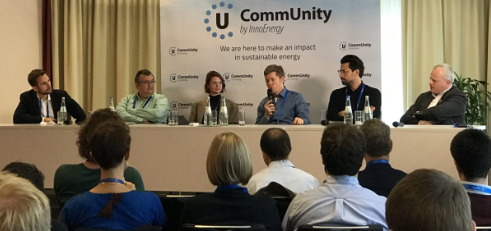With vast solar resources which could be harvested by ever-evolving PV technology, Africa offers huge potential for renewable energy across the residential, commercial and utility scale segments of the industry.
However, as attendees heard at the recent CommUnity Days event held by the EU-backed European Institute of Innovation and Technology’s (EIT) InnoEnergy group, financing projects remains a problem across Africa.
Utility scale
Forms of funding vary from micro-finance to guarantees for large scale projects, said Andres Gonzalez Garcia at the EIT event in Berlin. “Projects are only going to be bankable if their business plans are sustainable in the long term,” said the researcher from the Universal Access Lab founded by Spain’s Comillas Pontifical University and MIT.
Gonzalez Garcia said development finance institutions are interested in backing large scale renewables in Africa but said national policy frameworks are required to ensure clean energy funding remains sustainable.
His remarks were echoed elsewhere with industry insiders calling on African policymakers to move faster and enable investors to reach financial close in a timely manner.
Stefan Liebing, chairman of the German-African Business Association, told the CommUnity Days event the creditworthiness of renewable energy off-takers was often a concern to investors, including when the recipient was a utility. If Europe does not do more to fund renewables development in Africa, Liebing said, the money is likely to come from China instead and be funneled into coal plants.
Commercial solar
The conference, however, did hear more hopeful examples of commercial renewables projects, often installed for medium-sized energy consumers such as hospitals.
Emma Patmore, marketing manager for Berlin solar developer Ecoligo, said her company uses crowdfunding to develop commercial PV plants in developing countries and has financed 33 projects in Ghana, Kenya and Costa Rica, investing €3.2 million in the process.
Ecoligo has started eco-tourist projects in Costa Rica and provided power to Kenyan flower markets as well as developing facilities in Ghana for hospitals, universities, banks, other business office spaces and NGOs, said Patmore.
Apart from financing, Ecoligo has found operations and maintenance a challenge in Africa, said the marketing manager, and it worked with local teams to carry out such services.
Despite the hurdles, said Patmore, overseas investors recognize the opportunity offered in Africa by high retail energy prices.
Off-grid sector
Although small-scale, off-grid renewables projects are being widely adopted across the continent, loans from African banks often come with punitively high interest rates, according to Eduardo Appleyard, a former financing consultant at the United Nations Capital Development Fund.
Off-grid solar, which most commonly occurs as pay-as-you-go (PAYG) home systems or mini-grids in Africa, was a hot topic at the EIT event.
Echoing Appleyard’s criticism of commercial interest rates, Felix Boldt – chief executive of German off-grid solar system manufacturer Solarworx – added, financing for renewables was unlikely to come from state coffers, with the odd exception of nations such as Rwanda.
Solarworx instead collaborates with micro-finance institutions to promote deals with electricity distribution service companies which develop projects that use its technology.
Modularity is the key to scaling up off-grid systems in such markets, said Boldt, adding his company offers 60 V, direct current mini-grids which enable peer-to-peer trading of electricity between PAYG systems within communities.
“We do this in a bottom-up way, working with our collaborators on the ground and according to the local market requirements,” Boldt told pv magazine. A critical element of the Solarworx grid, he added, is it doesn’t require inverters and transformers. Thanks to its modular nature, the grid is owned by its customers and members of the community can choose whether to sign up. PAYG is used for the billing of energy transactions.
Such micro-grid innovation is gaining traction as a potentially viable business model to roll out renewables access in Africa and similar markets.






